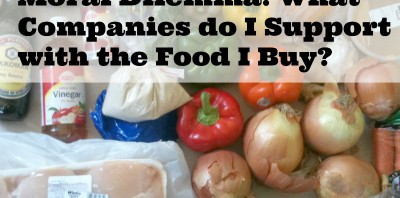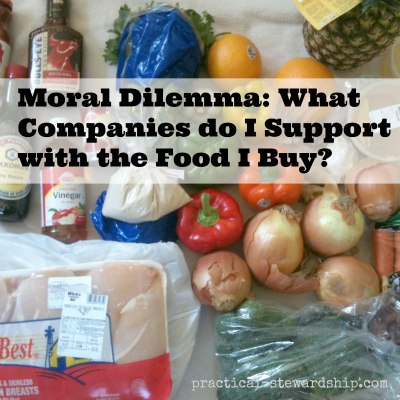Is it ever necessary for Christians to boycott certain companies because of their ideologies or expressed political or religious interests? Does the fact that Sonja does a Costco Quarterly update mean that she’s excited about Costco’s heavy Democratic leaning? (You ought not be surprised to know that we’re pretty conservative.) I love Apple products, though the company liberal leanings in their campaign contributions, etc.
To begin, we do not feel as though the dollars spent and/or saved are all that determine a good deal. There are lots of blogs out there devoted to finding the best deals; not us. We’re interested in (among other things) finding good deals on things worth buying. There’s a difference.
The Dilemma(s)
Not surprisingly, many Christians see a dilemma: How can we buy from a company that is active in its hatred of God?
I see an additional dilemma from the opposite direction: How can I endorse organic foods and clean eating when so many who do so are jerks about it and look down their noses at conventional eaters? How can I be associated with that sort of unloving snobbery?
One more dilemma, you know, for fun. How can I endorse sustainable farming practices when so many of the folks who do so are conspiracy theorists in search of strength in numbers against the unethical, monolithic establishment? How can I do this when I admire the dominion-taking and the bearing of God’s image and likeness that is reflected in the production of GMO’s while not necessarily preferring to ingest them?
Well, these are good questions, and not only because I asked them, but because their answers require biblical wisdom that we can apply in a host of arenas. And they deserve a wise answer. Until one comes along, I’ll offer my two cents and the general principles that drive us here at Practical-Stewardship.com.
It Gets Worse
As regards the dilemmas in view, the problem is even bigger than what first appears. Until Christ’s return (and even for a while after, frankly), there’s no way that we can think of to keep others from benefiting from any of our purchases regardless of whether or not we can endorse their ideologies, views, lifestyles or opinions. Really. Take any example. If we decide to homestead (so we don’t have to buy Proctor and Gamble products) and wish to churn our own butter (you know, from raw milk), we may have to buy nails to make the churn that were marketed and sold by a homosexual and gay-rights activist. There’s no escaping this problem.
The list of retailers who sell products that we (the Sarrs) buy on occasion (or frequently) is long. But of course responsibility means that we can’t just hang a banner across our home page that says, “Practical Stewardship does not necessarily endorse all of the views of the retailers and companies named on this site.” That’s totally true, but also a simplistic copout. We have entire categories of advertisements that we don’t allow on our site, but that does not keep a P90X ad from popping up on my post about why I don’t use P90X.
So since this problem is inescapable, we look to the principles in view.

Principle #1: Love
First, Christians are to me marked by and ruled by love, above all. But how does this apply to us? Take organic eating, for instance. Our organic leanings are not morally-driven; they are intended to be payoff- or wisdom-driven. That is to say, the conventional strawberries the size of small apples that we get from Costco don’t taste nearly as good as the smaller organic ones from Fred Meyer. The fact that they don’t have chemicals sprayed on them is a nice bonus, but not the point. They are almost certainly more nutritious as well, based on the research we’ve done. We like the idea of grass fed beef because we hear that it’s more nutritious and flavorful than conventional beef. But we have never bought a pound of it (by the way, now we are consistently buying free-range chicken). And we still eat beef, sometimes. And we try not to be jerks about it or freak out when others do, either. That takes us back to the love thing.
All food has been declared clean, according to Christ (Mark 7:19). So we may eat whatever we want without being in disobedience to Scripture for what we put in our mouths, from otter to Otter Pops, cola to candy bar. Though we can sin in the way we put things in our mouth, being gluttonous or selfish, etc., the foods themselves are clean. But that does not mean that there is no wisdom to be exercised in our eating. Just because it’s clean and it’s not sin does not mean I should feed my kid chocolate cake for breakfast (thank you, Bill Cosby).
So, Christians ought not to die on the hill of acting like the foods other people eat are unclean, yet this is precisely what we often do. Instead, we should love others. My kids have been known to tell others that certain foods are “bad for your body”. They’re right; they hear that from us. I have to own this, though their delivery is mostly tactless, foolish and potentially unkind. Just because the Sarrs don’t eat Cheetos doesn’t make them a moral evil (Ironic: on a road trip Joshie was begging for them at Subway last week…). We can train along these lines, and Christians should. We should operate under a principle of love and not be jerks.
I can do this when I see my friend with a Starbucks cup (Starbucks is one of my favorite haunts), and be happy for him, even though the Starbucks CEO supports some abominable things. My conscience can be clear even if I don’t say, “HOW CAN YOU PUT THAT RANCID CONVENTIONAL POISON IN YOUR BODY? DON’T YOU REALIZE THAT YOU’RE PADDING THE POCKETS OF GOD HATERS?!!!” It’s most loving in this situation to keep my mouth shut and enjoy a cup o’ liquid friendship with my friend.
This takes me to my second principle.
Principle #2: Grace
The myriad pagan channels that our food and products must travel to get to us represent multiple graces from God. We thank God for our meals and our blessings, and He uses pagans to bless us. Constantly. In countless ways. It’s all from God, ultimately. In a moment I’ll eat some granola, and I can cheerfully thank God for the honey and the oats and nuts which were probably harvested by unbelievers. He is using the efforts of unbelievers to be kind and gracious to me, to bless me, and I should be thankful for it. And this happens by God’s direct work, not in spite of His best intentions and efforts to keep my food channels clean.
This is yet another reason why Christians should take their work seriously: God does. When Christians are engaged in any lawful vocation (so prostitutes, mafia hit men and drug dealers need not apply), they can be sure that God is using them to be a blessing to His people. He’s at work all the way through the process.
You may agree with these principles or not, but they drive how we can – with clear conscience – endorse the products and services that we do here on our site…and eat our breakfast. You won’t find us saying that we will only drink raw milk because we refuse to drink pasteurized milk, or because of the inhumane treatment of cattle in most feedlots. But we may drink raw milk because lots of lactose intolerant and asthmatic folks drink it without any issues. And we won’t be persnickety when someone else drinks pasteurized milk, either.
For us, these things are freeing. We can replace guilt with gratitude and eat and drink to God’s glory.
What do you think? Do you have strong feelings one way or the other?
Have you read…?
- Confessions from a Selfish Daughter, Cancer, and A Mother’s Day Charge
- “Roundup Unready” & Our 2 Week Meal Plan #12
- Growing Our Own Food: Our Garden Update, Two Tips for the First Year Vegetable Gardener, and a Blessing
- Questions Worth Asking #5: Slavery to Any But Christ


Thank you for this post. God uses people in good ways, I think. So yes, the leadership of Starbucks or Costco are left-leaning, but the services and the jobs they provide are a common good.
Right. Well stated. And God uses Costco and Starbucks to bless our family on a regular basis.
“we may have to buy nails to make the churn that were marketed and sold by a homosexual and gay-rights activist. “????
How can you say that and in the paragraph above state: “How can I be associated with that sort of unloving snobbery?” Appears to me you may be practicing some of your own snobbery.
I have been truly enjoying your website until now. Sorry to say I am unsubscribing. I personally think these kinds of statements are hurtful and biased and have NOTHING to do with the food choices I make. Good Luck to you and your…followers.
Audrey,
I am not ashamed to admit that I am a conservative Christian who does not approve of things that the Bible calls abominations, such as homosexuality. I spoke in caricatured terms in the post, using extremes to make a point, though that may have been unclear. But I stand by my comments, regardless. Though I may be guilty of snobbery (I don’t want to…), disapproving of sin is not itself snobbery; being a snob about it is. That’s something we shouldn’t do.
But not approving of homosexuality does not mean that I cannot love homosexuals. This is why I suggested that the principles that drive our decision making ought to be grace and love. This also means a willingness to call sin “sin.”
When matters of something like food (remembering too, that Christ has called all foods clean) become divisive, we err. This should not be the case. So I would argue my comments in their proper context do have to do with the food choices we make.
I do appreciate your comments.
I. Love. This. Post. For real. Visiting from Welcome Home Wednesday.
Thanks much, Stacy. Have a good Wednesday, and thanks for the visit.
Thanks so much for your balanced and Bible-informed post on this very touchy subject. I was just explaining to my 9-year-old daughter earlier today why we choose not to shop at a particular retailer, so the subject of where our money goes was on my mind more than usual. We, like you, try to spend our money wisely, not just well, but we also realize that in a fallen world, even the ideal is imperfect.
Thanks, Meredith. That’s great that you’re taking opportunity to help your 9-year-old make some informed decisions.